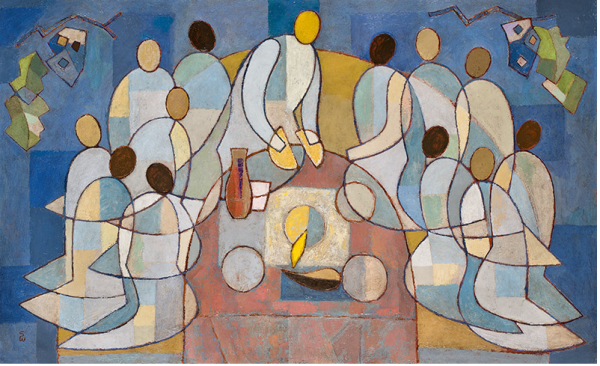Living from God’s Abundance

Sermon for May 3, 2020
The Rev. Andria Skornik
There’s a movie that’s gotten a lot of attention since the start of the pandemic, called Platform. It’s a fairly intense thriller, so it’s not for everyone. But it has an interesting premise. It’s about a prison where inmates are housed at different levels, and every day their food is sent down on a platform to the different levels. Now, enough food gets put on the platform for everyone to eat. But for that to happen, it depends entirely on people taking only what they need. This means the prisoners at the top levels would have to restrain themselves so that there’s food left when it gets to those on the bottom. Which of course doesn’t happen. The prisoners at the top gorge themselves with little regard for those below. And even though the order is switched up every month — so that you could go from being at the top level to the bottom overnight — it’s not enough to make people change their behavior when they’re at the top.
The film’s popularity comes from how much it resonates with some of behavior we’ve seen as a result of COVID-19. The people gorging themselves in the film is striking visual for those early on buying up all the toilet paper, medical masks, or hand sanitizer. Or, more recently, large corporations taking millions in aid meant for small businesses to pay employees. But the film also speaks to the frustration many of us feel on the other side of all that. Because, in the film, not everyone in the prison is uncaring or out to get what they can. There are people who see the absurdity and injustice of the situation and want it to change. But at the same time, they (perhaps like us) struggle because it’s hard to organize that many people when you’re spread out and don’t have a good way to organize or communicate. Or when you can’t immediately see how your actions affect others. As we watch the characters in the film who’re trying to bring about change so that everyone is fed — their question soon becomes our own. Which is, what would it take to spark solidarity so that all the needs could be met?
From another angle it’s actually the kind of question raised by today’s reading from Acts. It talks about how the people in early church communities came together and held what they had in common so that everyone had what they needed. And how they ate together and everyone was happy. It’s a really wonderful image. And it came about because, after Jesus’ death and resurrection, people started to organize around the things he taught, which was very much about looking out for the needs of others, looking to God to meet one’s needs, not being so attached to money and possessions, and, being generous with what one does have and using it to do good.
We talk about the church as the body of Christ, and the early church was doing that. Embodying and continuing Jesus’ ministry. And because Jesus included poor and rich alike in his ministry, when those people came together there was a balance. The poor were fed, and the rich saw what they had doing more significant things than ever before. As a result, not only were people taken care of, but they were happy. And it says that even people outside of the community liked what they were doing. It was positive all around.
As we think about what made this wonderful thing possible, I notice, for one, that they came together around a shared value — which was their love of Jesus and his vision of love for the world. That was the starting point. Then, as it says, they stayed fixed on those values by being rooted in scripture: which would’ve been the Hebrew texts and Jesus and his disciples’ teaching. So they had these ideas continually challenging them, moving them, getting them on the same page. They also worshiped together, which has a way of helping us come into alignment with God’s desires. And they also lived from a place of abundance. Or, as the reading says, everything they did, they did with glad and generous hearts.
Theologically, this means living from the sense that God is a generous God, who loves us and wants to take care of us; who has given us a beautiful world with more than what we need; and who uses us to meet the needs of others. It’s what’s affirmed in the psalms — like Psalm 23 that we heard today — “The Lord is my shepherd I shall not want… he spreads a table before me and my cup runneth over.” Or in our gospel, image of God as a good shepherd who takes care of the sheep. Seeing the world in this way is what allows a person to part with their stuff, or give with a generous heart, or not worry that someone else is getting more or that one’s needs won’t be met. It allows for looking at what one does have with gratitude. It’s an inspired way to see the world, but a still a choice that has to be made each day.
These readings come to us at a good time. Because, in the time we’re in, it’s so easy to think in terms of scarcity. We see the job loss, what’s happening in the markets, the way it’s hitting countries that were already struggling. For some, the threat of scarcity has prompted greed and the hoarding of resources. But even if that’s not us, it’s still hard not to take on the same mindset of scarcity — that place where it seems like there’s not enough and there never will be. That the problems are too great. Or, even if we’re in the place where we’re having our needs met, if this is where our minds are at, we may have a hard time seeing it or getting to enjoy it if we’re consumed with fear.
But that’s not where our thinking has to be. As people of faith, we have recourse to an alternative. And that is, first, that we not lose sight of God’s abundance. That we keep in view all that God has given us — this beautiful world, the tables that are spread out before us, how God is providing for us even now. And second, it’s that we not lose light of our responsibility to each other, and all others. Much like what the people in Acts discovered, there’s enough to go around, but it depends on our generosity, our willingness to share both the joy and the sacrifice of life together, and ability to trust that there will be enough if we live in this way.
We can think about how this time in particular is calling us to live from God’s abundance, and give in such a way that the needs are met. I’ve seen really beautiful ways people are doing this. How people are supporting local businesses, buying gift cards and doing pick-up orders, making donations as groups reach out. Or this last week, how in a couple of days the Woodstock Farmer’s Market hit their “Go Fund Me” goal to be able to launch this summer. For some people it’s been their time and volunteering skills. One parishioner told me she does better when she’s making the masks. A friend share how she bought bananas from a restaurant to then give to her church’s food pantry. Another how she’s helped launch a program called “Stimulus for All” to help undocumented families.
Early on in all of this, our bishop, Michael Hanley, said, “Everyone will be affected. But if we all share some of the sacrifice, no one will have to carry it all, and things will be okay.” I choose to believe that.
In this life, in this moment, we sit at a table of resources. There is a feast that has been spread out before us. Let us imagine our lives like the Acts table; seeing see all that is spread before us and giving and receiving it with glad and generous hearts.
